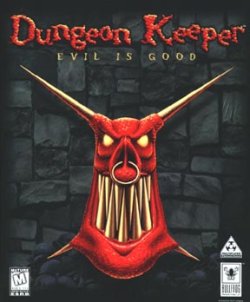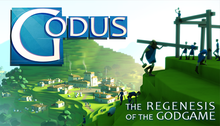
Populous is a video game developed by Bullfrog Productions and published by Electronic Arts, released originally for the Amiga in 1989, and is regarded by many as the first god game. With over four million copies sold, Populous is one of the best-selling PC games of all time.
Real-time strategy (RTS) is a subgenre of strategy video games that does not progress incrementally in turns, but allow all players to play simultaneously, in "real time." By contrast, in turn-based strategy (TBS) games, players take turns to play. The term "real-time strategy" was coined by Brett Sperry to market Dune II in the early 1990s.

Peter Douglas Molyneux is an English video game designer and programmer. He created the god games Populous, Dungeon Keeper, and Black & White, as well as Theme Park, the Fable series, Curiosity: What's Inside the Cube?, and Godus. In 2012 he founded and currently runs 22cans, a video game development studio.

A role-playing video game, role-playing game (RPG) or computer role-playing game (CRPG) is a video game genre where the player controls the actions of a character immersed in some well-defined world, usually involving some form of character development by way of recording statistics. Many role-playing video games have origins in tabletop role-playing games and use much of the same terminology, settings, and game mechanics. Other major similarities with pen-and-paper games include developed story-telling and narrative elements, player character development, complexity, as well as replay value and immersion. The electronic medium removes the necessity for a gamemaster and increases combat resolution speed. RPGs have evolved from simple text-based console-window games into visually rich 3D experiences.
Simulation video games are a diverse super-category of video games, generally designed to closely simulate real world activities. A simulation game attempts to copy various activities from real life in the form of a game for various purposes such as training, analysis, prediction, or entertainment. Usually there are no strictly defined goals in the game, and the player is allowed to control a character or environment freely. Well-known examples are war games, business games, and role play simulation. From three basic types of strategic, planning, and learning exercises: games, simulations, and case studies, a number of hybrids may be considered, including simulation games that are used as case studies. Comparisons of the merits of simulation games versus other teaching techniques have been carried out by many researchers and a number of comprehensive reviews have been published.

Black & White is a god video game developed by Lionhead Studios and published by Electronic Arts for Microsoft Windows in 2001 and by Feral Interactive in 2002 for Mac OS. Black & White combines elements of artificial life and strategy. The player acts as a god whose goal is to defeat Nemesis, another god who wants to take over the world. A primary theme is the concept of good and evil, with the atmosphere being affected by the player's moral choices. The core gameplay mechanic of Black & White is the interaction between the player and an avatar creature, who carries out the player's instructions and whose personality and behaviour change in reaction to how they are treated. Multiplayer is supported over a local network or online.

Bullfrog Productions Limited was a British video game developer based in Guildford, England. Founded in 1987 by Peter Molyneux and Les Edgar, the company gained recognition in 1989 for their third release, Populous, and is also well known for titles such as Theme Park, Theme Hospital, Magic Carpet, Syndicate and Dungeon Keeper. Bullfrog's name was derived from an ornament in the offices of Edgar's and Molyneux's other enterprise, Taurus Impact Systems, Bullfrog's precursor where Molyneux and Edgar were developing business software. Bullfrog Productions was founded as a separate entity after Commodore mistook Taurus for a similarly named company.
An action-adventure game is a video game hybrid genre that combines core elements from both the action game and adventure game genres.

Dungeon Siege is an action role-playing game developed by Gas Powered Games and published by Microsoft in April 2002, for Microsoft Windows, and the following year by Destineer for Mac OS X. Set in the pseudo-medieval kingdom of Ehb, the high fantasy game follows a young farmer and her companions as they journey to defeat an invading force. Initially only seeking to warn the nearby town of the invasion of a race of creatures named the Krug, the farmer and the companions that join her along the way are soon swept up in finding a way to defeat another race called the Seck, resurgent after being trapped for 300 years. Unlike other role-playing video games of the time, the world of Dungeon Siege does not have levels but is a single, continuous area without loading screens that the player journeys through, fighting hordes of enemies. Also, rather than setting character classes and manually controlling all of the characters in the group, the player controls their overall tactics and weapons and magic usage, which direct their character growth.

4X is a subgenre of strategy-based computer and board games, and includes both turn-based and real-time strategy titles. The gameplay generally involves building an empire. Emphasis is placed upon economic and technological development, as well as a range of military and non-military routes to supremacy.

Dungeon Keeper is a strategy video game developed by Bullfrog Productions and released by Electronic Arts in June 1997 for MS-DOS and Windows 95. In Dungeon Keeper, the player builds and manages a dungeon, protecting it from invading 'hero' characters intent on stealing accumulated treasures, killing monsters and ultimately the player's demise. The ultimate goal is to conquer the world by destroying the heroic forces and rival dungeon keepers in each realm. A character known as the Avatar appears as the final hero. Dungeon Keeper uses Creative Technology's SoundFont technology to enhance its atmosphere. Multiplayer with up to four players is supported using a modem, or over a local network.
Tactical role-playing games, also known as strategy role-playing games and in Japan as simulation RPGs, are a video game genre that combines core elements of role-playing video games with those of tactical strategy video games. The formats of tactical RPGs are much like traditional tabletop role-playing games and strategy games in appearance, pacing, and rule structure. Likewise, early tabletop role-playing games are descended from skirmish wargames such as Chainmail, which were primarily concerned with combat.

Populous: The Beginning is a real-time strategy video game and the third entry in the Populous series, developed by Bullfrog Productions. The game was released in 1998 on Microsoft Windows, and in 1999 for the PlayStation. Unlike earlier games in the series, which cast the player in the role of a god influencing loyal followers, The Beginning took a radical departure and placed the player in the role of a shaman, who directly leads her tribe against opponents. Throughout the twenty-five missions of the campaign, the player leads their tribe across a solar system, dominating enemy tribes and tapping new sources of magic, with the ultimate goal of the shaman attaining godhood herself.
The following outline is provided as an overview of and topical guide to video games:

Populous II: Trials of the Olympian Gods is a 1991 strategy video game in the Populous series for the Amiga, Atari ST and MS-DOS-based computers, developed by Bullfrog Productions. Populous II is a direct sequel to Bullfrog's earlier game Populous and is one of the company's most notable games.

Life simulation games form a subgenre of simulation video games in which the player lives or controls one or more virtual characters. Such a game can revolve around "individuals and relationships, or it could be a simulation of an ecosystem". Other terms include artificial life game and simulated life game (SLG).
Tower defense (TD) is a subgenre of strategy games where the goal is to defend a player's territories or possessions by obstructing the enemy attackers or by stopping enemies from reaching the exits, usually achieved by placing defensive structures on or along their path of attack. This typically means building a variety of different structures that serve to automatically block, impede, attack or destroy enemies. Tower defense is seen as a subgenre of real-time strategy video games, due to its real-time origins, even though many modern tower defense games include aspects of turn-based strategy. Strategic choice and positioning of defensive elements is an essential strategy of the genre.
Strategy is a major video game genre that emphasizes thinking and planning over direct instant action in order to achieve victory. Although many types of video games can contain strategic elements, as a genre, strategy games are most commonly defined as those with a primary focus on high-level strategy, logistics and resource management. They are also usually divided into two main sub-categories: turn-based and real-time, but there are also many strategy cross/sub-genres that feature additional elements such as tactics, diplomacy, economics and exploration.

Godus is a god video game developed by 22cans and published by DeNA. The company launched a Kickstarter campaign to raise funds and met their funding goal on 20 December 2012. Godus was designed by Peter Molyneux, who described it as the spiritual successor to his earlier creation, Populous. A real-time strategy, combat game spin-off, Godus Wars, was released in 2016. While the mobile versions of Godus continue to be updated, the PC editions of both games never left Steam Early Access, and are no longer available for purchase on the Steam store.












